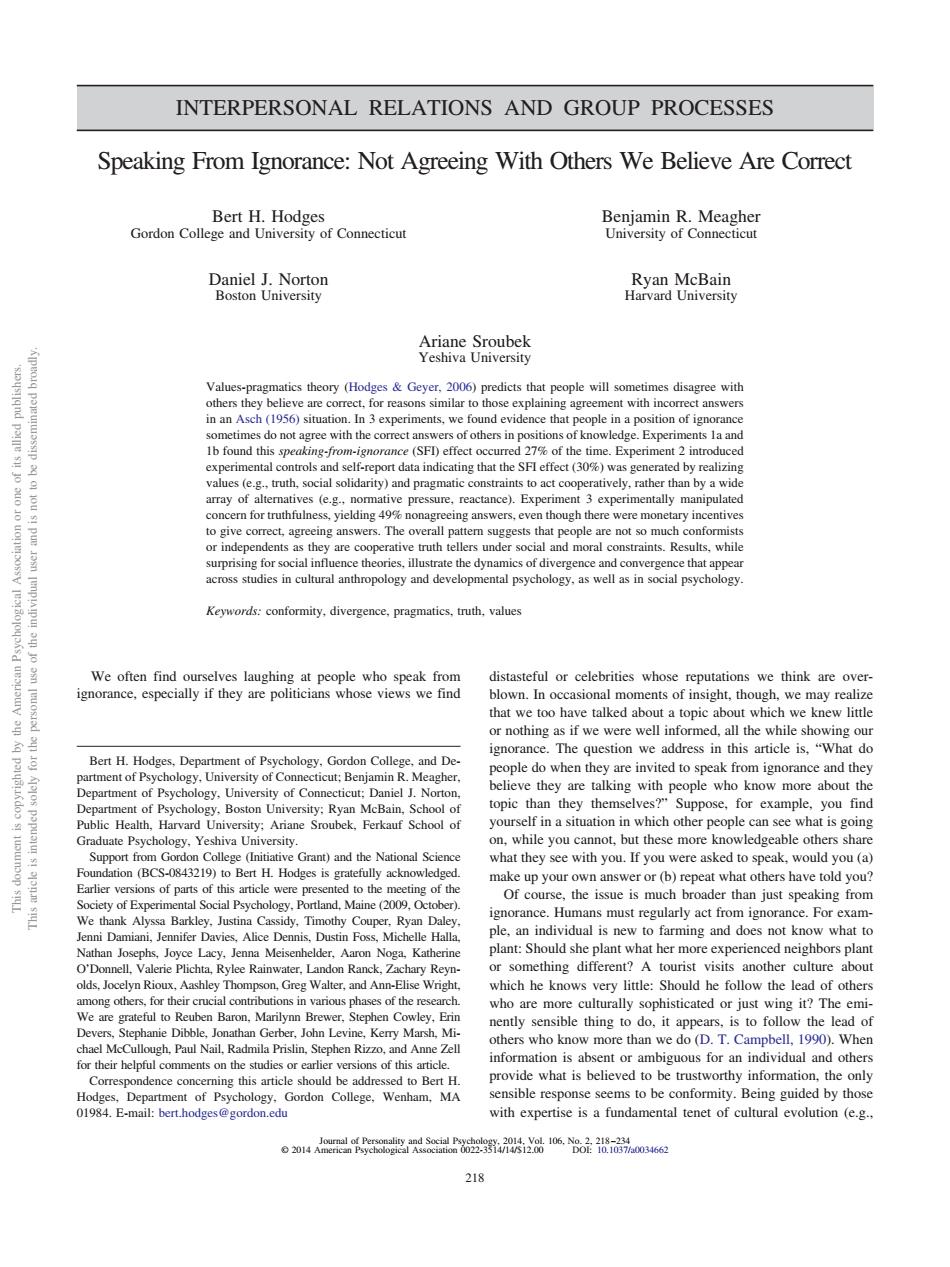正在加载图片...

INTERPERSONAL RELATIONS AND GROUP PROCESSES Speaking From Ignorance:Not Agreeing With Others We Believe Are Correct Bert H.Hodges Gordon College and University of Connecticut ERM PaietNao e en Oneht y(HodgesGeyer,2006)predicts that people will sometime n an asch (1956 s we fo nd evidence that eople in a po n of i h 27% of the y,rather th by awid nd moral co hi相 cand devekpmentaoeychology Keywords:conformity.divergence.pragmatics.truth.values distasteful or celebrities whose reputations we think are over gnorance.especially if they are politicians t d ve they are talking with people who knov more about th opic than they themse Suppose.for exampl you Iin what they see with you.If you were asked to speak,would you (a) gnorance. Humans must regularly act from ignoran For xam 1B something different?A tourist visits ible thing to do.it appear is to follow v more tha ve do heir heloful or ear of this ble n ng guided by th (e.g 218INTERPERSONAL RELATIONS AND GROUP PROCESSES Speaking From Ignorance: Not Agreeing With Others We Believe Are Correct Bert H. Hodges Gordon College and University of Connecticut Benjamin R. Meagher University of Connecticut Daniel J. Norton Boston University Ryan McBain Harvard University Ariane Sroubek Yeshiva University Values-pragmatics theory (Hodges & Geyer, 2006) predicts that people will sometimes disagree with others they believe are correct, for reasons similar to those explaining agreement with incorrect answers in an Asch (1956) situation. In 3 experiments, we found evidence that people in a position of ignorance sometimes do not agree with the correct answers of others in positions of knowledge. Experiments 1a and 1b found this speaking-from-ignorance (SFI) effect occurred 27% of the time. Experiment 2 introduced experimental controls and self-report data indicating that the SFI effect (30%) was generated by realizing values (e.g., truth, social solidarity) and pragmatic constraints to act cooperatively, rather than by a wide array of alternatives (e.g., normative pressure, reactance). Experiment 3 experimentally manipulated concern for truthfulness, yielding 49% nonagreeing answers, even though there were monetary incentives to give correct, agreeing answers. The overall pattern suggests that people are not so much conformists or independents as they are cooperative truth tellers under social and moral constraints. Results, while surprising for social influence theories, illustrate the dynamics of divergence and convergence that appear across studies in cultural anthropology and developmental psychology, as well as in social psychology. Keywords: conformity, divergence, pragmatics, truth, values We often find ourselves laughing at people who speak from ignorance, especially if they are politicians whose views we find distasteful or celebrities whose reputations we think are overblown. In occasional moments of insight, though, we may realize that we too have talked about a topic about which we knew little or nothing as if we were well informed, all the while showing our ignorance. The question we address in this article is, “What do people do when they are invited to speak from ignorance and they believe they are talking with people who know more about the topic than they themselves?” Suppose, for example, you find yourself in a situation in which other people can see what is going on, while you cannot, but these more knowledgeable others share what they see with you. If you were asked to speak, would you (a) make up your own answer or (b) repeat what others have told you? Of course, the issue is much broader than just speaking from ignorance. Humans must regularly act from ignorance. For example, an individual is new to farming and does not know what to plant: Should she plant what her more experienced neighbors plant or something different? A tourist visits another culture about which he knows very little: Should he follow the lead of others who are more culturally sophisticated or just wing it? The eminently sensible thing to do, it appears, is to follow the lead of others who know more than we do (D. T. Campbell, 1990). When information is absent or ambiguous for an individual and others provide what is believed to be trustworthy information, the only sensible response seems to be conformity. Being guided by those with expertise is a fundamental tenet of cultural evolution (e.g., Bert H. Hodges, Department of Psychology, Gordon College, and Department of Psychology, University of Connecticut; Benjamin R. Meagher, Department of Psychology, University of Connecticut; Daniel J. Norton, Department of Psychology, Boston University; Ryan McBain, School of Public Health, Harvard University; Ariane Sroubek, Ferkauf School of Graduate Psychology, Yeshiva University. Support from Gordon College (Initiative Grant) and the National Science Foundation (BCS-0843219) to Bert H. Hodges is gratefully acknowledged. Earlier versions of parts of this article were presented to the meeting of the Society of Experimental Social Psychology, Portland, Maine (2009, October). We thank Alyssa Barkley, Justina Cassidy, Timothy Couper, Ryan Daley, Jenni Damiani, Jennifer Davies, Alice Dennis, Dustin Foss, Michelle Halla, Nathan Josephs, Joyce Lacy, Jenna Meisenhelder, Aaron Noga, Katherine O’Donnell, Valerie Plichta, Rylee Rainwater, Landon Ranck, Zachary Reynolds, Jocelyn Rioux, Aashley Thompson, Greg Walter, and Ann-Elise Wright, among others, for their crucial contributions in various phases of the research. We are grateful to Reuben Baron, Marilynn Brewer, Stephen Cowley, Erin Devers, Stephanie Dibble, Jonathan Gerber, John Levine, Kerry Marsh, Michael McCullough, Paul Nail, Radmila Prislin, Stephen Rizzo, and Anne Zell for their helpful comments on the studies or earlier versions of this article. Correspondence concerning this article should be addressed to Bert H. Hodges, Department of Psychology, Gordon College, Wenham, MA 01984. E-mail: bert.hodges@gordon.edu This document is copyrighted by the American Psychological Association or one of its allied publishers. This article is intended solely for the personal use of the individual user and is not to be disseminated broadly. Journal of Personality and Social Psychology, 2014, Vol. 106, No. 2, 218 –234 © 2014 American Psychological Association 0022-3514/14/$12.00 DOI: 10.1037/a0034662 218